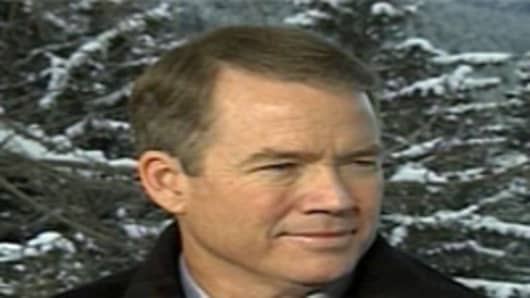Compared to last year, we are hearing a lot more about growth in this new reality, Steve Ellis, worldwide managing director of the consulting firm Bain & Company, told CNBC on Wednesday.
"We see in talking to CEOs all around the world that global economic conditions continue to improve in the short-run, but we see a fragile and somewhat anemic recovery," Ellis said.
"Bain's baseline scenario for GDP expansion in 2011 is at the lower end of the range (of the third party forecasters)," he said, adding, "we're trying to manage through, what I would describe as, a economic tightrope in both the U.S., Europe and actually even in China."
"For instance in the U.S. we're trying to spur employment growth, we're trying to get consumer spending up, but at the same time consumers have a huge amount of deleveraging still to do and there will be massive reductions in government spending, at the state and federal level, to address crippling deficits," Ellis said.
"In Europe, as an example, we are lurching ahead as sovereign default risk is being deferred—it's not actually being resolved and that's putting the euro at risk," he said.
"The issue in China is simply the fact that they got an investment-driven growth agenda and the problem is its creating a significant asset inflation in the economy," Ellis said.
The new uncertainty is China, as they continue to clamp down on some of the stimulus, raise bank reserves and requirements for down-payments on second homes, is they can't afford to stall growth "below an 8 percent level without creating some issues on unemployment," he said.
"We do believe there is a significant asset bubble in China, driven in the housing market, there's a lot of over-capacity in the industrial sector," Ellis said.
"The challenge is the combination of all of them together [U.S., Europe and China]. The fact that we have all three operating in parallel, and the fact that they are also all interdependent, is why we have reason to be cautious," he said.
"This new reality, which seems to be a little bit less certain than the past but there appear to be more topics focused on growth in the emerging markets, more topics on innovation, more topics on public private partnerships to try to climb our way out of what has been a very, very deep recession," Ellis concluded.
_____________________________
More from David Faber:
thefaberreport.cnbc.com and strategysession.cnbc.com,
Follow David on Twitter:
@DAVIDFABERCNBC
Questions? Comments? Write to faberreport@cnbc.com.




